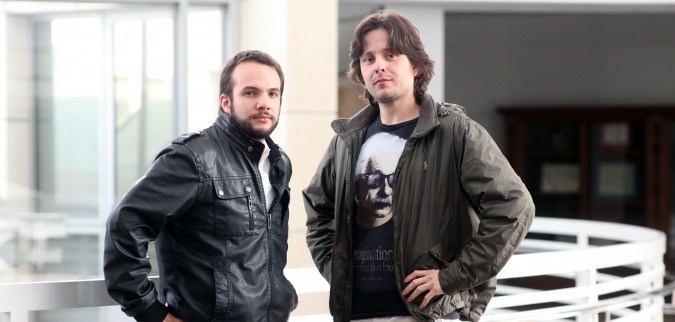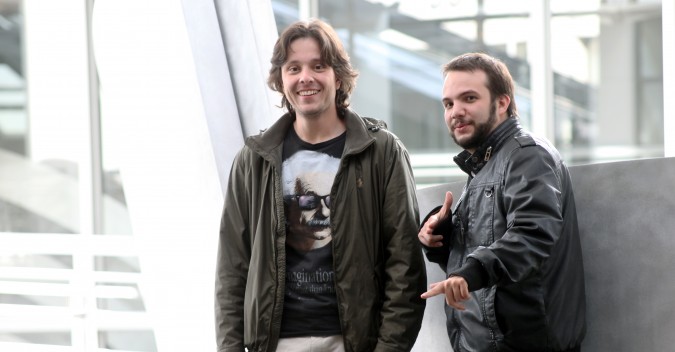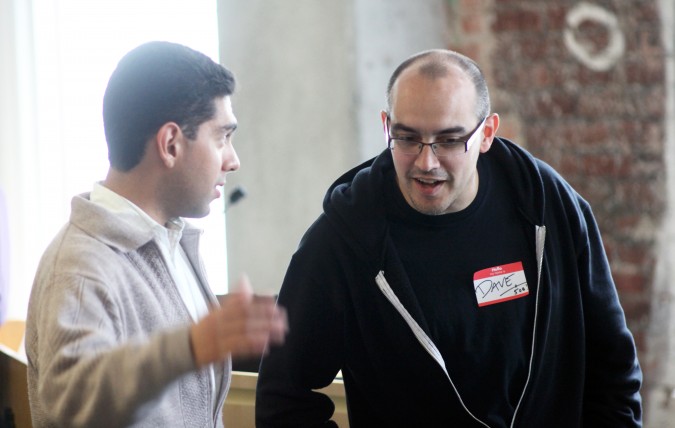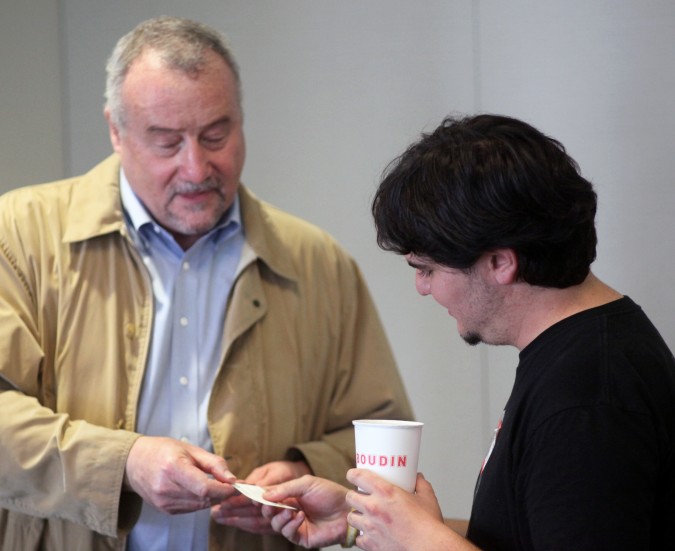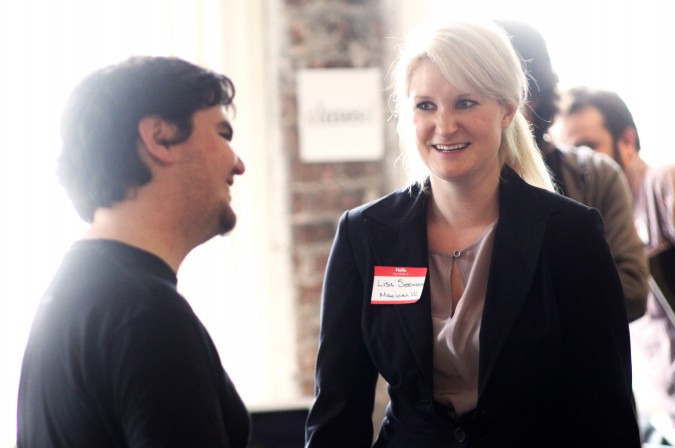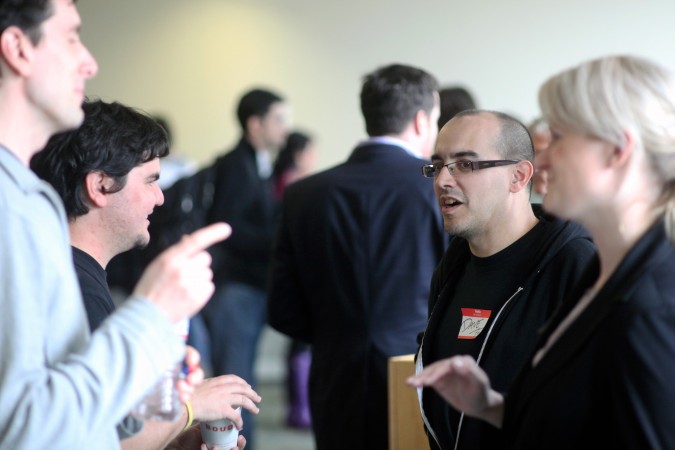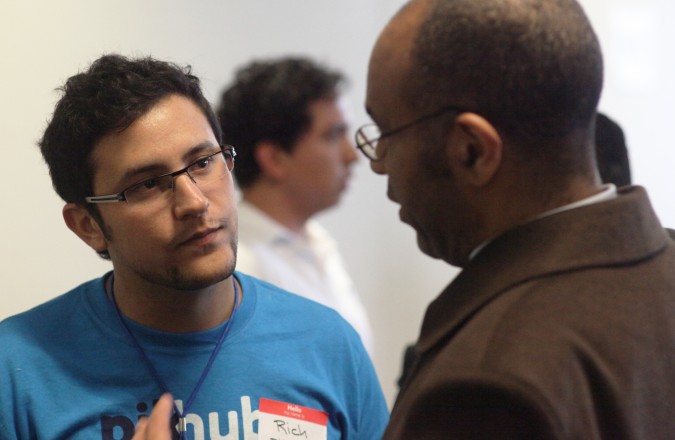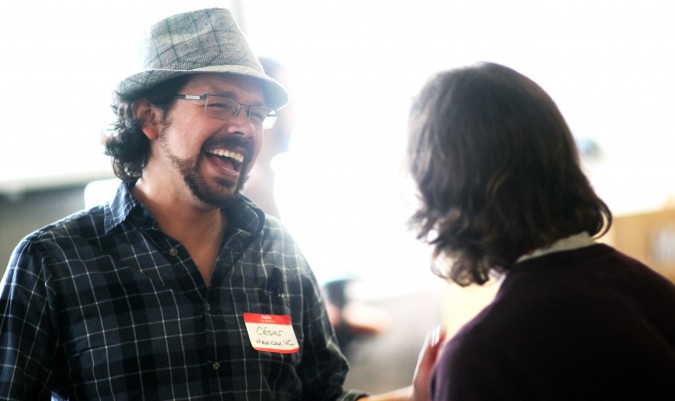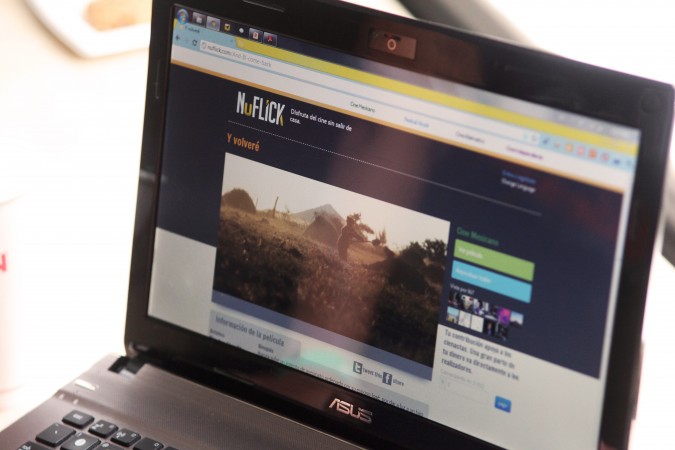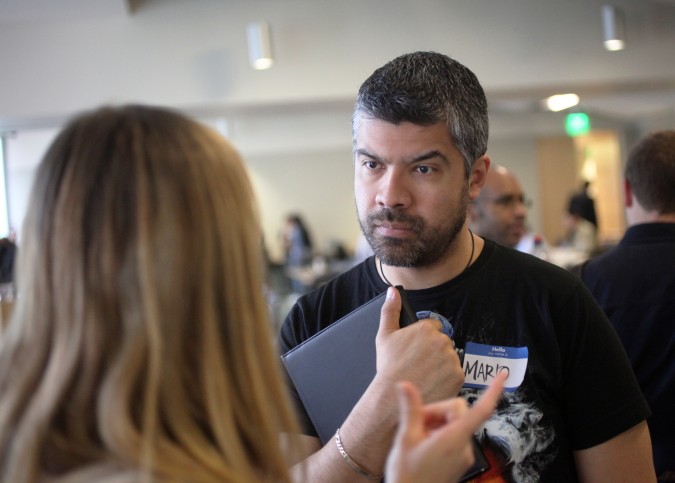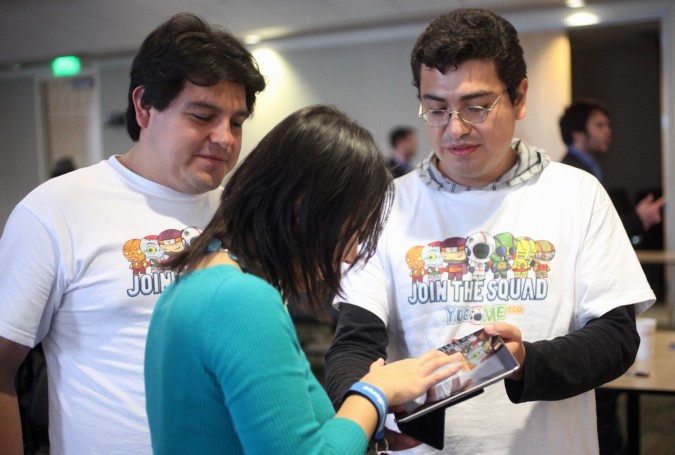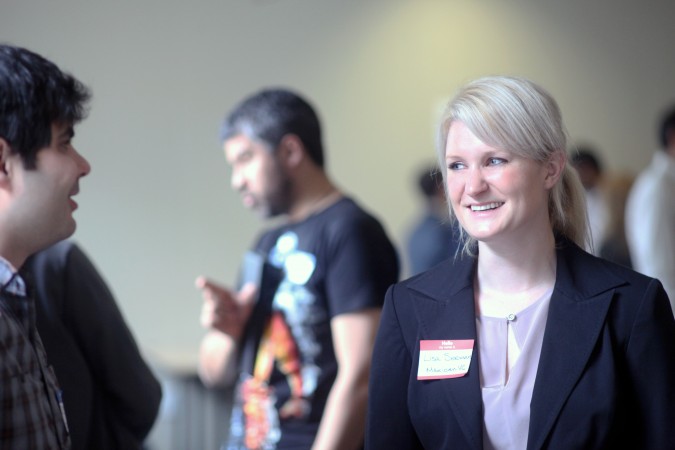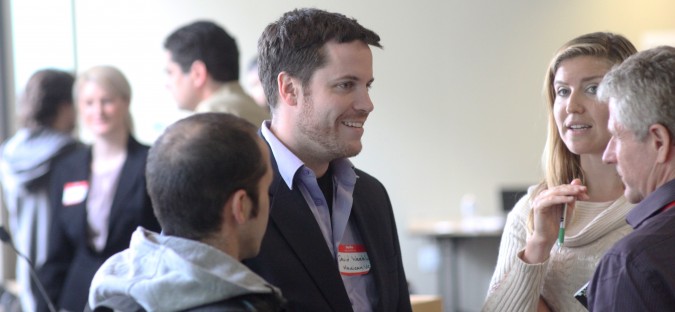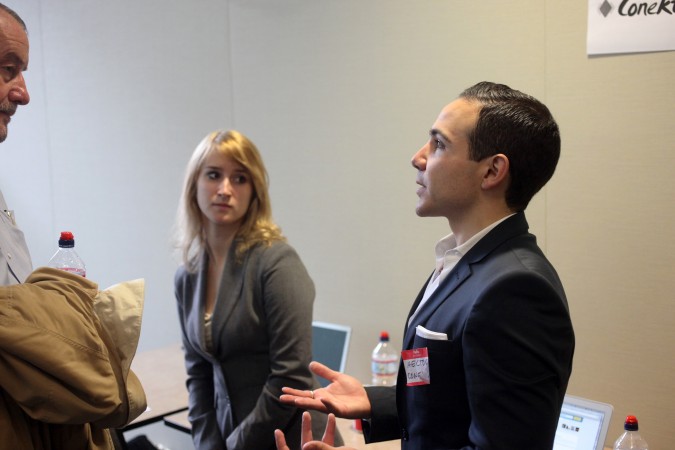Archive for the ‘Fontacto’ tag
ClasesD is SkillShare.com for Mexico
On Friday, March 16, 2012, I attended the first ‘graduation’ of the first ‘class’ of companies funded by the new seed stage venture capital firm mexican.vc. mexican.vc is run by four sharp General Partners — David Weekly, Santiago Zavala, Lisa Seeman and César Salazar.
mexican.vc has signed up prominent mentors to help, including Dave McClure, the founding partner of 500 Startups.
After the presentations, the teams dispersed around the conference room at Microsoft’s office at 835 Market Street in San Francisco, California USA. There were seven teams altogether. Three of the teams were set up along the left wall and three of the teams were set up against the right wall.
I introduced myself to and interviewed all those teams on Friday, and I wrote a long blog post about them that night.
What I didn’t know at the time was that the seventh team had set up their station up front in the room, where there was not a table, but a podium. That arrangement never registered with me that day, even though I had several lengthy conversations with people by that podium after the presentations. I didn’t know a team was there engaging with attendees. So that team, ClasesD, missed out on the commentary I wrote for my Friday blog post.
I was upset that I missed a team, so I wrote in that Friday post that I was willing to meet with the team I overlooked. The team found my blog post and reached out to me via my Facebook page.
I met the team yesterday afternoon, March 18, 2012, and we had an enjoyable meeting at the San Francisco Main Branch library at Civic Center in the City. I signed out one of the glass work rooms on the 4th floor so that we could talk without disturbing others.
Luis Enrique Aguilera and José Eduardo González described their company to me, and I had time to ask questions.
Before I get into my remarks, here is what the website for mexican.vc has to say about ClasesD:
“Interested in learning Spanish? Want to take yoga during your lunch break? You are in the right place! ClasesD is a marketplace for in-person lessons taught by independent professionals. Earlier this year when founder Eduardo was looking for dance lessons for his sister, he realized there must be a better way to advertise classes than flyers tacked on corkboards around town. Now, his team is helping people craving for knowledge find the right tutor in their city.”
Here are my comments about ClasesD:
ClasesD is SkillShare for Mexico. This is my observation, not something I heard from Aguilera or González. SkillShare is based in New York City, USA, and they have raised millions of dollars to pursue their business.
Although comparisons to airbnb have grown somewhat tiresome, such a comparison to ClasesD is inevitable. airbnb turned everyone that’s not homeless into a potential operator of a bed and breakfast. SkillShare and ClasesD turn everyone into a potential operator of a one teacher school.
If you’re a good cook, musician, painter, photographer, writer or mathematician, you can list your qualifications on ClasesD by creating a profile. Potential students can browse listings and read about the widely varied offerings. Of course, classes can be about anything, not just the example subjects I listed in this paragraph. Teachers set their own prices.
Students indicate their interest in a class and then the ClasesD website connects teacher and student together by telephone. This gives the teacher an opportunity to sell themselves to the student to increase the chances that prospects become customers. This highly personalized sales process might be unwieldy at scale, but I think it’s preferable in these early stages where the parties are still getting used to having an online marketplace to find each other in Mexico.
ClasesD makes money by charging a fee, currently 100 pesos (USD $7.93 at today’s exchange rate), to the teacher for providing the lead. Teachers keep all of the fee that they charge to attend their classes.
mexican.vc graduated 7 teams on Friday, including Fontacto. As I wrote in Friday’s post, Fontacto is Ring Central for Mexico. Fontacto helps small organizations appear big by offering a virtualized phone system that in its physical version is generally too costly to purchase and install at the organization. In a bit of portfolio company collaboration that would make any investor proud, ClasesD is a savvy consumer of Fontacto’s impressive telephony services.
One of the many impressive features offered by Fontacto is the ability to set up apparently numerous extensions on one physical telephone number.
ClasesD publishes a Fontacto powered phone number for students to call teachers on. Each teacher has an assigned extension number in the Fontacto system. Student’s calls are routed to the teacher, who can answer on whatever phone is most convenient at the time, including their mobile phone or their Skype connection. All the teacher’s assigned devices ring simultaneously, I presume, since that’s one of the features offered by Fontacto, and it makes sense to enable it for this application, where the students are probably most likely to become paying students if they reach the teacher on the first attempt.
ClasesD has a chicken and egg dilema — they need lots of teachers before they can get lots of students, but it’s tough to get lots of teachers until they have lots of students.
Marketplaces such as SkillShare and ClasesD are compelling to me. The operator of the marketplace does not have to stock and finance inventory. People expect to pay for services delivered through such marketplaces. The margins can be attractive given what needs to be done to operate the marketplace.
Aguilera and González struck me as passionate and determined. They’re learning quickly, and have tested several business models already on their search for the best model for Mexico. Their enthusiasm was evident from the moment they contacted me. I am not running TechCrunch, GigaOm or VentureBeat. I’m writing a personal blog. I will get perhaps 12,000 visitors to this site this month (I had 10,321 visitors in February, 2012). I still haven’t cracked the top million sites on Alexa. This is easy for others to check out. That Aguilera and González tracked me down and patiently explained their business to me to get a tiny amount of press shows to me that they are really trying to make ClasesD a success. They are well spoken and likable guys, and I wish them all the best.
My advice to them is to find a prove a business model that works, and then raise a million or more US dollars immediately to accelerate populating the site with more teachers and students. If you don’t solve the chicken and egg problem, a competitor will spring forth to do it for themselves, using your research to move more quickly.
Here are the biographical introductions for Aguilera and González, again from the mexican.vc website:
“Luis Enrique Aguilera graduated from ITESM Guadalajara with a B.S. in Business Administration. He is an entrepreneur, creative mind, and music aficionado. He is passionate about web marketing and SEO. He previously worked as a marketing and business consultant, which taught him to create powerful and innovative business models that he is eager to apply to his own startup.
José Eduardo González graduated from ITESM with a B.S. in Computer Science. Before founding ClasesD, he worked for 2 years as a Ruby on Rails developer in a startup called Inovaz (now a 500 startups company with their product Ovia), where he got his first taste of entrepreneurship and learned agile development practices.”
Aguilera and González graciously posed for pictures at the end of our meeting. I used the photogenic interior of the San Francisco Main Branch library as the backdrop. It was fun showing Aguilera and González around the library as this was their first visit. I attended the grand opening of the library on April 18, 1996, which featured a dramatic special delivery of the door key by skydiver Carl Prigee to Mayor Willie Brown after Prigee jumped from a biplane and landed right on target in front of the library, to the applause of the thousands gathered in attendance.
mexican.vc Demo Day, March 16, 2012 in San Francisco, California USA
This afternoon, March 16, 2012, I attended the Demo Day for the first graduating class of Internet startups funded by mexican.vc.
mexican.vc is a new seed stage venture capital firm based in Silicon Valley.
mexican.vc invests only in Internet companies that reside in Mexico.
mexican.vc currently invests USD $20,000 for 15% of the startups it accepts into its highly competitive program that includes mentorship, legal work and investor introductions.
mexican.vc is not an incubator and physical space is not provided to portfolio companies.
Portfolio companies are scattered throughout Mexico, which was a surprise to the general partners that run the brand new firm.
Some 75 teams applied for funding, but only seven firms were admitted to the first ‘class.’
Today’s ‘graduation’ of the first ‘class’ was an exciting thing to watch.
I attended because I am (barely) friends with David Weekly, one of the founders of mexico.vc, and via Facebook Weekly invited his friends to attend. I signed up as a blogger and brought my Canon 5D Mark II and a tripod to the event, held at Microsoft’s San Francisco office at 835 Market Street.
As a side note, I met Weekly soon after he co-founded Hacker Dojo in Mountain View, California. Weekly is a well known and well connected entrepreneur who writes a quality blog. While I was researching this story, I discovered that on March 8, 2012 Weekly advised non-technical Internet company startup founders to learn to program. Weekly said it’s essentially impossible to recruit a good technical cofounder to your company for no pay. I wrote a strongly worded blog post on March 11, 2012 giving the same advice to learn to program. I did not see Weekly’s outstanding post until today.
In part, Weekly writes:
“Napster was Shawn Fanning’s first Windows program – he was teaching himself how to code on his uncle’s couch so the early betas had lots of atrocious bugs. The company didn’t need a longstanding Windows expert to put the tech together, it needed someone who was willing to put in the elbow grease to figure out how to do it. In other words if you’re looking for a technical cofounder consider becoming one. It’s just too hard to find random technical people who don’t know you, are highly competent, and are happy to work for no pay and very little equity on your idea. (surprise!)”
I know I am writing a post about mexican.vc and not startups generally, but this is such a great quote and such a great opportunity to print it that I couldn’t resist. Napster was one of the most significant programs of the Internet age, and I learned from David Weekly tonight that the creator of Napster was not a Windows programmer before he coded the Windows version of Napster! I don’t know if Fanning was a programmer of other languages prior to this effort. But even so, my advice and Weekly’s advice is worth listening to. Learn to program, even if you plan to be the Barista, CFO, Janitor, CEO, Office Manager or Administrative Assistant.
Your life will only improve if you can also program.
Now back to mexican.vc’s Demo Day.
Here are the summaries word for word from the mexican.vc website of the companies I saw present today.
I will indent the official summaries. Then I will write my comments on that team and their product.
What mexican.vc says on its website about Yogome:
“This small team of brilliant hackers and designers is building better educational games for K-12 children mainly on the iOS (iPhone & iPad) platform. They are partnering with educational institutions to build fun, educational adventures that help kids learn more effectively. The characters in the game are superheroes fighting against the Queen Ignorantia.”
My comments on Yogome.com:
Yogome is my favorite of the companies I saw today. Their iPhone and iPad game is gorgeous. It looks like it was designed by a large game company, not three people that have been at it just a few months. Amazingly, this game today was the 10th most popular free educational downloadable application in the Apple App Store. It’s been zooming up in the rankings, jumping over 24,000% in the last week, according to a genuine hockey stick graph the team showed during their pitch. Even crazier, their app is number one in Thailand today in the same category.
Yogome plans to continue to give their apps away for free. They will make money by offering so-called ‘in app’ purchases where an existing player can upgrade after they have already discovered how wonderful the free app is. I like this strategy.
I persuaded Manolo Diaz of Yogome to show me one of Yogome’s games while I captured HD video. He narrates as he shows how to play the game, which teaches children to recycle by having them pickup apple cores, banana peels, bottles and cups and drop them in the correct recycle bin. Speed and accuracy are rewarded, and there is educational text at the end alerting players to what they learned and why it matters. The graphics in this game are lush, polished and delightful. Students play about half an hour per session, according to Diaz, indicating the games are engaging and fun.
What mexican.vc says on its website about Cactus:
“Through their initial startup experience, the team learned the ins and outs of the restaurant industry, both from the vendor and consumer perspectives. Cactus now offers a geo-aware mobile app that grants access to discounts in a growing network of restaurants. The basic app is free, giving users instant access to thousands of discounts. Moreover, users can upgrade to a premium subscription and enjoy substantially larger savings on every affiliated restaurant.”
My comments on Cactus:
This iPhone app looks well designed and smart. It’s not a Groupon like loser. Instead, it’s a phone enabled price discount system that gives restauranteurs real time analytics at the point of sale. A customer searches through a list of nearby eateries on their iPhone. When they find one they like, they show their phone screen to the cashier or waitperson, who enters the unique code on the screen into the Cactus website. The Cactus website then immediately tells the restaurant how many times the customer has eaten there via the Cactus system.
This personalization strikes me as very smart, and I can see restaurants being able to provide better service with this data so easily accessible. I predict such analytics will go a long way towards enticing reluctant restaurants to give Cactus a try.
I neglected to ask why they named their startup Cactus.
Free users of Cactus receive about a 10% discount and paid users receive about a 20% discount. Not bad.
What mexican.vc says on its website about ClassesD:
“Interested in learning Spanish? Want to take yoga during your lunch break? You are in the right place! ClasesD is a marketplace for in-person lessons taught by independent professionals. Earlier this year when founder Eduardo was looking for dance lessons for his sister, he realized there must be a better way to advertise classes than flyers tacked on corkboards around town. Now, his team is helping people craving for knowledge find the right tutor in their city.”
My comments on ClassesD:
I didn’t have a chance to visit with this team after their presentation. I simply didn’t see their table. I’m sorry about this, as I intended to and had time to see every team. If the team is still in town, I’d be happy to meet them to interview them so I can cover them as well.
What mexican.vc says on its website about Conekta:
“Conekta is a local business directory that allows users to find and share information about any type of business across Mexico, through both mobile and web platforms. Conekta focuses on making its information accurate and up to date to ensure users find what they are looking for.”
My comments on Conekta:
I love the premise of Conekta, which is to be a recommendation engine similar to Yelp, but tailored for the culture I was told is prevalent in Mexico. Apparently people in Mexico routinely friend on Facebook people they don’t know directly, but that their immediate friends do know. This means people have large friends lists. I was told people in Mexico distrust reviews written by complete strangers, but pay attention to reviews written by their Facebook friends, even if they don’t know them personally.
The clever approach by Conekta given the above is that the reviews are distributed within the loose confines of the Facebook friends system. Reviews are public so they can be found by search engines for purposes of search engine optimization. But reviews are filtered when viewed through the Conekta website so that users see just the reviews of their friends. This is brilliant I think. Conekta can attract new users because reviews will show up in Google search results. But once users are also Conekta customers, the list of reviews shrinks to those written by your friends. Users can follow reviewers that are not their friends, which allows for prolific and respected reviewers to build an audience and fan base. This is likely very helpful for people that don’t have many friends in their social networks.
What mexican.vc says on its website about NuFlick:
“Founded by hackers passionate about the independent movie industry (the primary founder was a filmmaker herself), Nuflick is trying to solve how independent movies are distributed on the Internet by building a platform to connect independent producers and films with viewers worldwide. Having been in the industry, the team understands the incentives of filmmakers and the limitations of conventional distributors, and we feel they have a real shot at disrupting the current system.”
My comments on NuFlick:
NuFlick is taking on an almost crazy challenge. They want to be the Netflix of independent movies. They are on track to have 500 movies available for streaming by May 2012. They are in Microsoft’s BizSpark program, and apparently Microsoft offers video streaming for free as part of their offerings to help young companies grow. This is a luxury and very generous of Microsoft. What gives me hope is the founders are passionate and are making progress. Their site is attractive, and their business cards are supremely clever. Their cards resemble old school tear apart movie tickets, before the industry went to custom printed tickets for each customer.
NuFlick is making enough waves that groups with catalogs of movies are now approaching them asking to distribute via their platform. This is flattering, and I hope NuFlick recognizes how lucky they are to have that happen at such an early stage in their development.
What mexican.vc says on its website about Fontacto:
“Intrigued by how to measure conversions on advertising that displays phone numbers, the Fontacto team started working on generating analytics around phone calls. In the processed they learned how these metrics show clients different ways to improve their marketing messages, their conversation rates and their phone sales/support process. Now, they’re bringing the power of VoIP to the long tail of small business entrepreneurs and independent professionals.”
My comments on Fontacto:
Fontacto is another exceptionally ambitious company, like NuFlick. Fontacto wants to be RingCentral for Mexico. Fontacto has built a working system and I am pretty certain they have customers already. I got a demo of the website, and it looks classy and smart. Users can choose their phone number and sign up entirely online. When calls come in to that number, Fontacto can ring multiple destination phones all at once. Skype is one of the supported destination phone types.
The most captivating feature for me was the ability for a recipient of a Fontacto call to transfer it to another Fontacto extension from the keypad.
Fontacto is not trying to be Google Voice, which is about individual users. I am a Google Voice user.
Fontacto is designed to allow small organizations to set up a big company sounding phone system, with mailboxes, auto attendant and routing of calls.
One nice touch is that you can elect to have Fontacto’s real human voice actors record your greetings so you don’t have to use your own voice. Right now this is included in the base price, though I learned this feature may become a premium feature.
What mexican.vc says on its website about pikhub:
“We all know how important events are for our social needs, however it’s still very difficult to find all the memories and interactions of an event in a single place. Pikhub is the place to gather everyone’s experience within an event. People can share and find all the pictures, attendees and interactions that happened there through a beautiful mobile experience.”
My comments on pikhub:
pikhub wants to be your picture hub. Today people go to events and then post them to albums they create on Facebook and Flickr. This results in numerous disconnected albums scattered over the Internet for big events like weddings, concerts and parties. pikhub would like all the attendees of sizable events to use pikhub as the central focus point for comprehensive coverage of sizable events.
pikhub is not trying to replace media storage on Flickr, Facebook or YouTube. They still want and expect people to store their actual media at those sites. The magic happens when pikhub users link to all the third party storage locations in a spoke like fashion where the center of the spokes converge at pikhub. This is cool because the spokes can lead to locations your friends control or locations controlled by people you don’t know and might never know, in the case of larger events like concerts, parades and marches.
I don’t follow this kind of company closely, so I don’t know if there are already similar sites in existence. If there are, please leave a comment alerting me.
Those are the seven companies that presented.
Impressive.
Keep in mind that there are essentially no seed stage venture capital firms in Mexico, according to the people inside and outside of mexican.vc that I interviewed for this story today. So the entrepreneurs in this first class are breaking new ground. They didn’t have peers nearby that they could ask questions of about the process of raising money from professional investors. This had to be intimidating to come to San Francisco to present in the offices of software giant Microsoft. Microsoft was kind to donate use of their very nice conference room on Market Street for this event.
I introduced myself to the three General Partners of mexican.vc that I hadn’t yet met. I had good conversations with all of them, and I came away feeling energized. These people are not your typical venture capitalists. They strike me as true entrepreneurs. I think they’ll be able to pull this off, because they seem to have a can do attitude for something I see as being very, very difficult — finding the gems in a huge, dispersed population in a country without a history in the Internet startup world.
For posterity, here are the biographies of the four General Partners in mexican.vc, which I copied from their exceptionally clean and understated website:
David Weekly — San Mateo, California USA
“David has been programming since he was five and has coded for MIT, Harvard, Stanford, There.com, atWeb, and Legato. David wrote the first layman’s description of MP3 in early 1997 and graduated in 2000 with a BS in Computer Science from Stanford, where he was a President Scholar and a finalist in the ACM International Programming Competition. David started the company that became PBworks in 2003. David cofounded SuperHappyDevHouse and HackerDojo. He has been a key promoter of hacker and startup culture in Silicon Valley and Mexico. He likes to throw hacker parties, fly helicopters, ride his motorcycle, and make useful things.”
Santiago Zavala — Mountain View, California USA
“Santiago has been programming and building stuff for a lifetime. He is a true hacker always trying to become a better hacker. Early in life he started an online community with thousands of users. After some years, we was a key player in the development of products such as Tikkia and DoingIt. Lately, he has been developing serious games at Innovations Games and not so serious game during his free time. Santiago is a cofounder of SuperHappyDevHouse Mexico City. He is also the editor of the weekly Hacker Digest newsletter.”
César Salazar — México, DF
“César has been a web developer and entrepreneur for almost 10 years now. During the last three years he has lead key efforts to empower the startup and hacker communities in Mexico. He specializes in User Experience Architecture and Product Engineering. He describes himself as a behavioralist, traveler and hacker culture practitioner, always interested in what makes people act the way we do. He is the original founder of 42 Claps. He is also one of the cofounders of SuperHappyDevHouse Mexico City and Hackspedition.”
Lisa Seeman — San Francisco, California USA
“Lisa is a born hacker and businesswoman. The daughter of two physicists, she received her BS with Honors in Electrical Engineering from the California Institute of Technology and was a National Science Foundation Graduate Research Fellow at Stanford University, earning her Masters in Electrical Engineering. Lisa was a management consultant at L.E.K. Consulting before becoming the first employee and Vice President of Engineering of IncentAlign, a sales optimization startup in Silicon Valley with business ties in China and Japan. Lisa has been a founder or team member of startups spanning the space of digital media, image recognition, sales optimization, and greentech.”
The event began at 2pm and it is now 3am the next day. I got home from the event at 7pm and began writing this post and editing the pictures and video I captured.
I hope that I made some new friends today. It was exhilarating to talk with so many interesting entrepreneurs. I stayed up late because I know people want to see these pictures. I uploaded them at full camera resolution of 21 megapixels. To see the full size versions, click on the pictures, wait for the huge version to load, and then click on it again to bring it to full size, which is larger than your screen.
I invite everybody I met today to friend me on Facebook.
Say hello. I would like to stay in touch.
